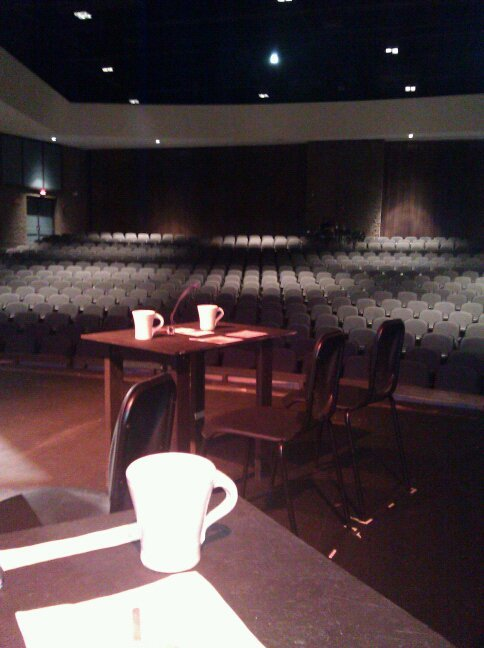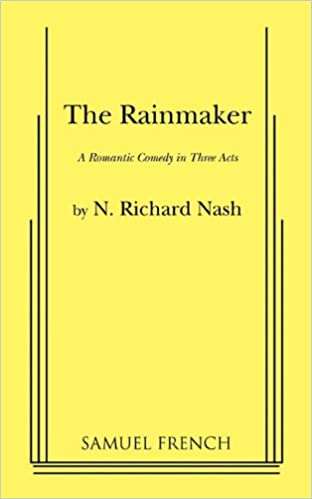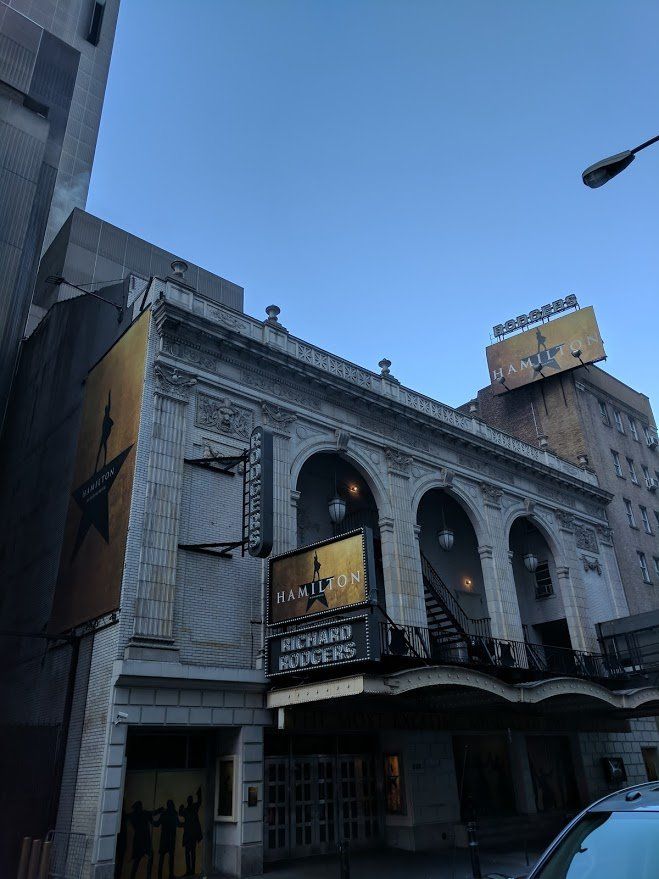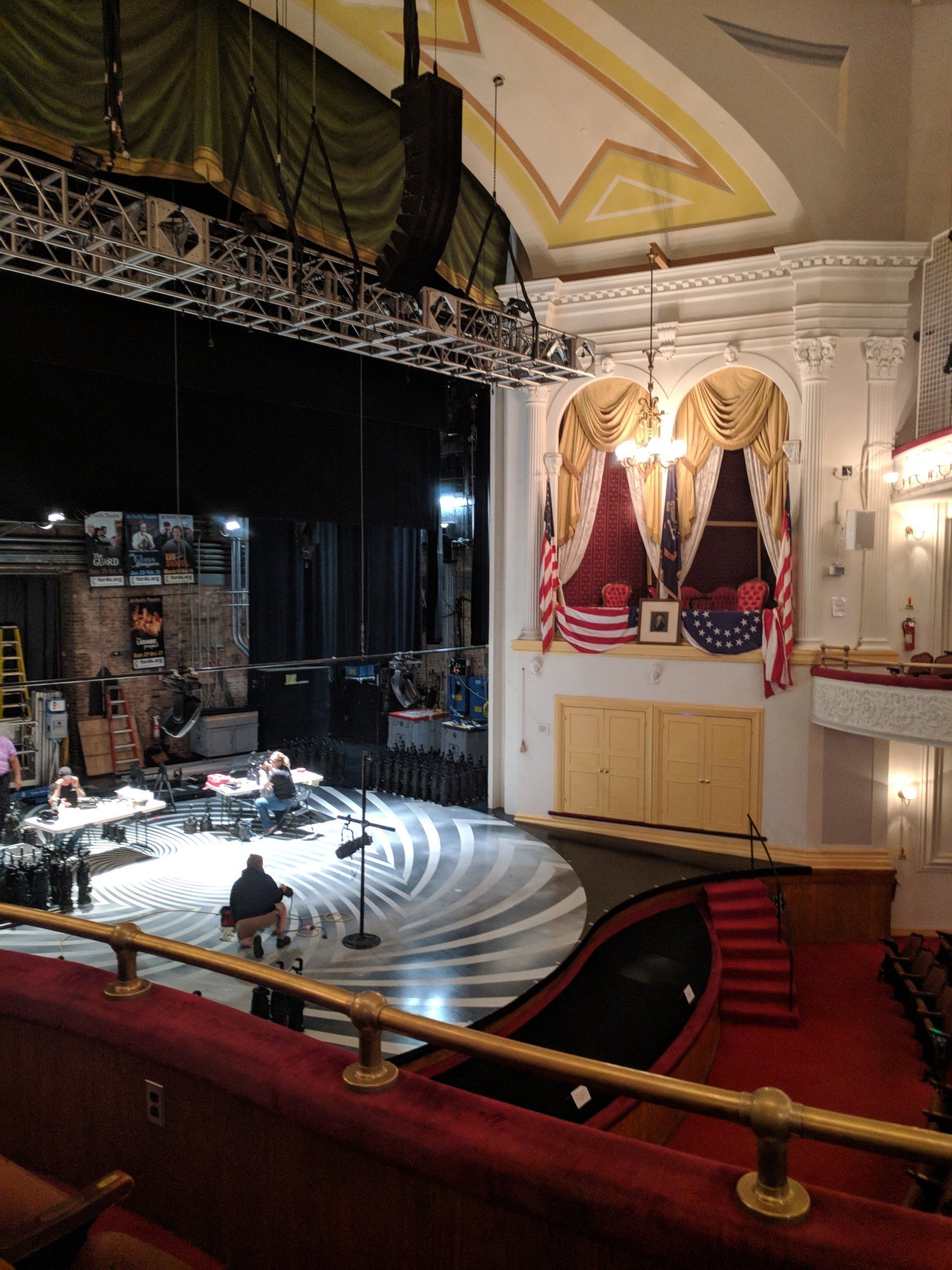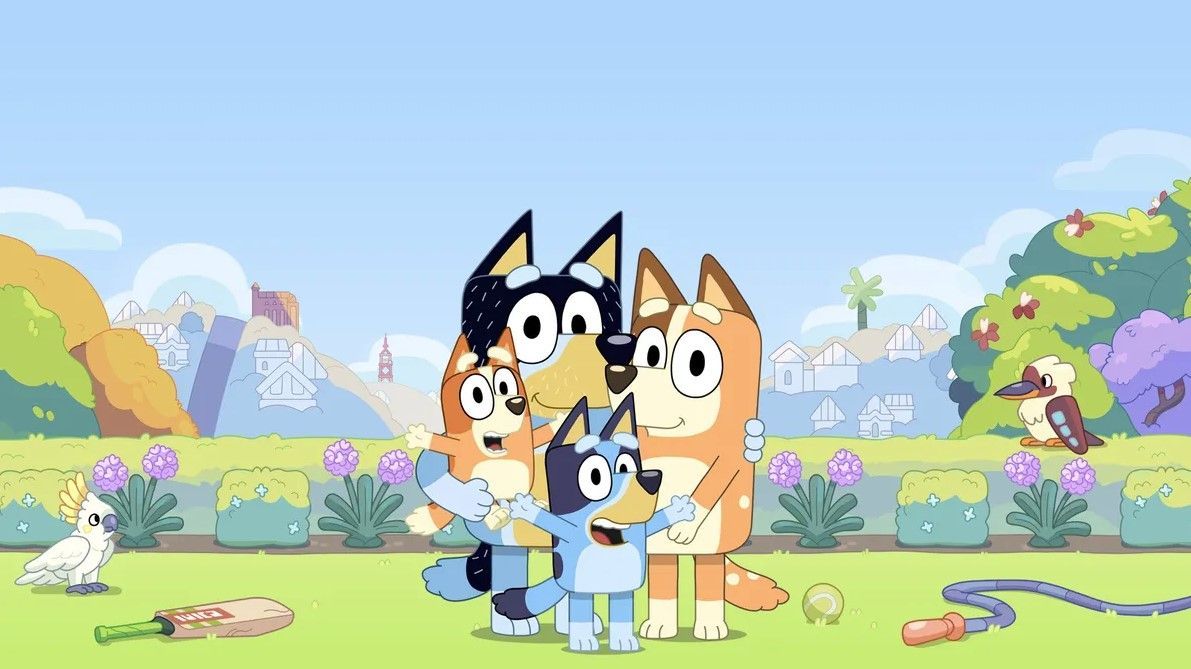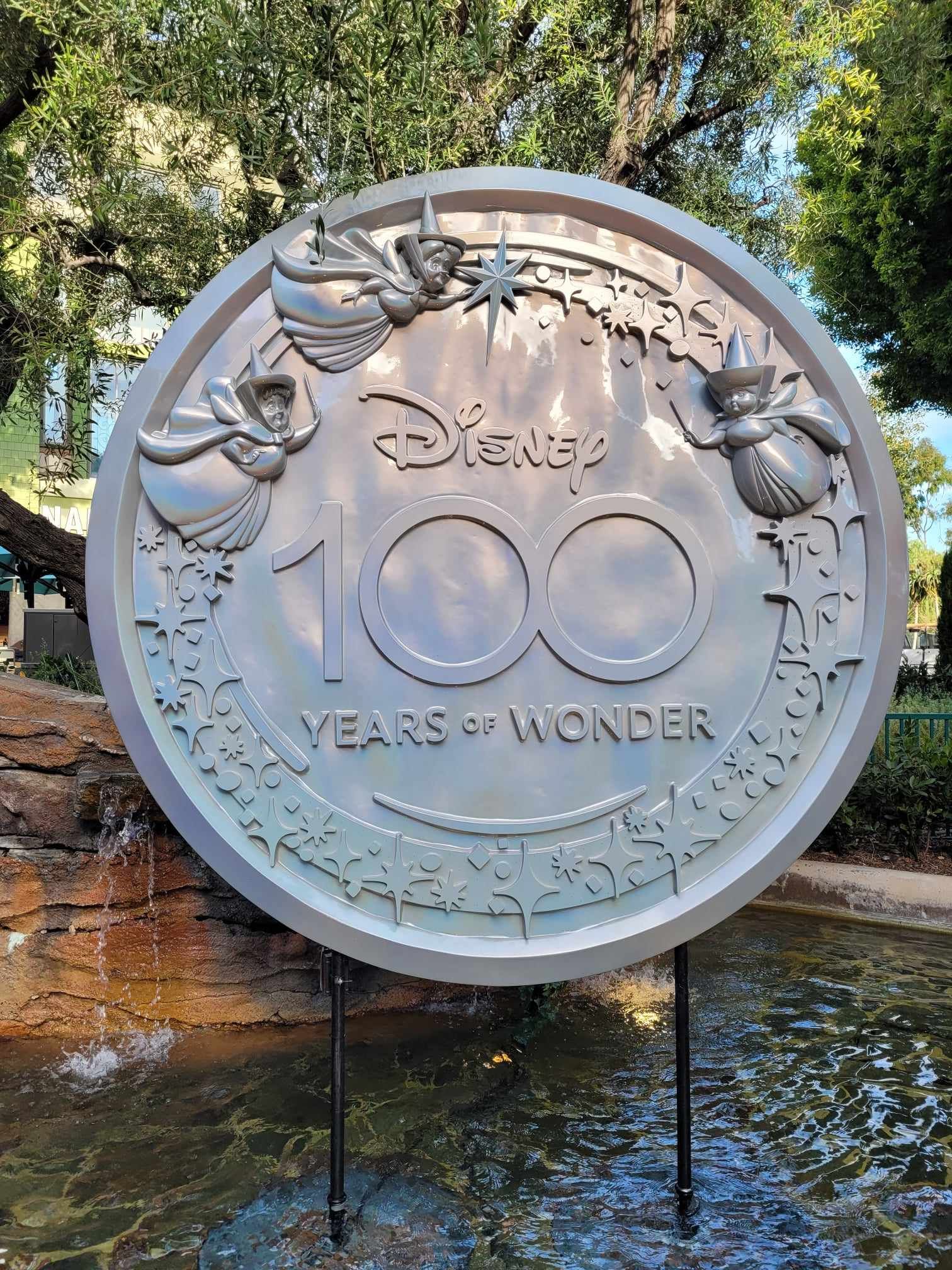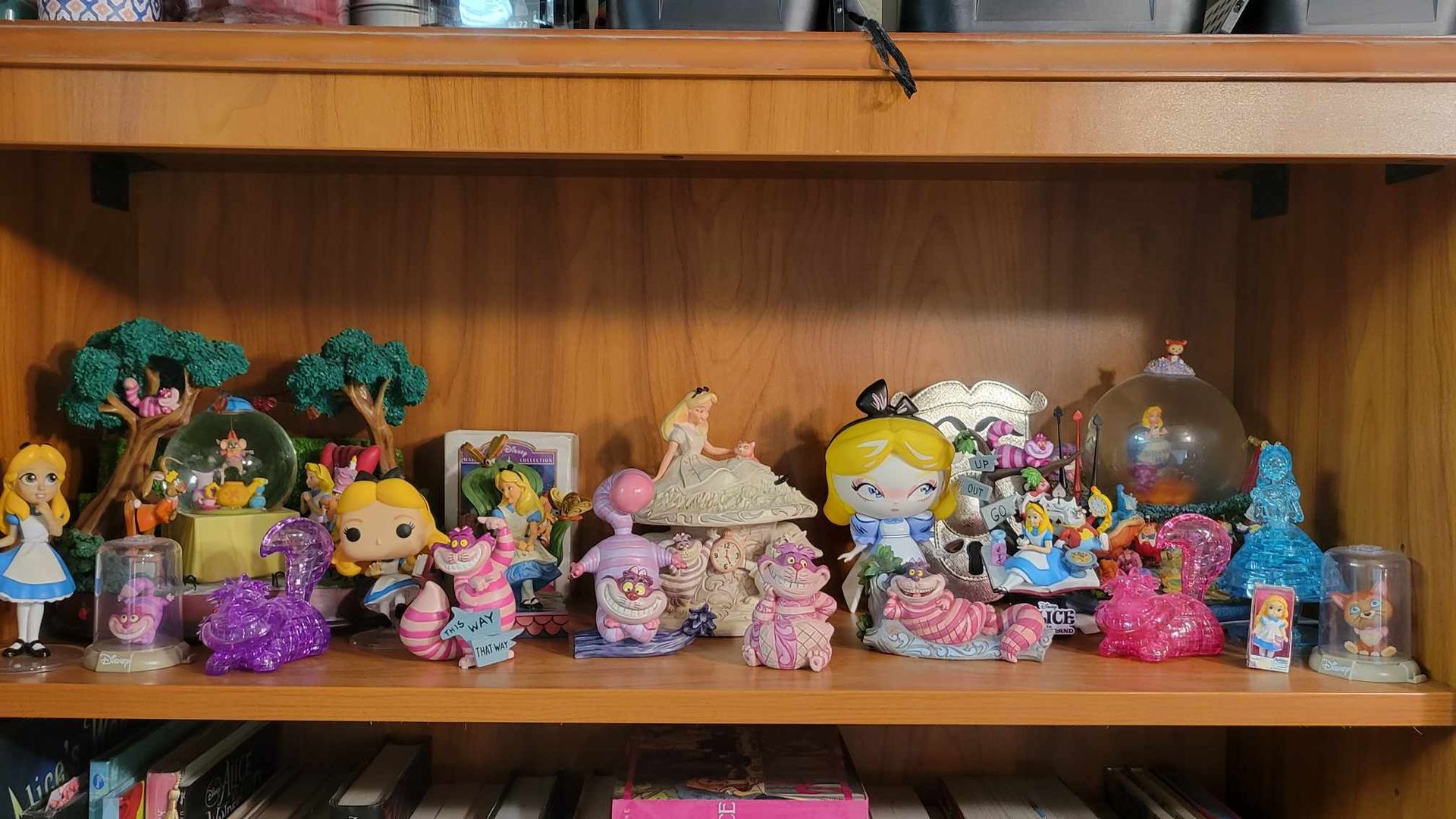Craig D. Barton is a creative consultant, editor, and writer, having written for and consulted on multiple Disney Editions books and various other projects. Besides being a self-described "DisNerd," Craig is an advocate for all arts, loves travel, movies, making his own eclectic music playlists, and, most of all, spending time with his family. Craig currently resides in Avondale, AZ with his lovely wife, quirky daughter, and just plain weird cat.
The Theatre: An Appreciation in Education
by Craig D. Barton
A view from the stage before opening night: of "1776." Photo ©Craig D. Barton
As it entertains, inspires, and motivates, theatre becomes the great educator. It has an opportunity to teach on, and from, the stage.
I’ve been fortunate over the years to have been able to remain in contact with my high school theatre arts teacher, Mr. Lyman Akers. “Akes,” as known to almost all of us, was the kind of teacher every kid wanted; in no way, shape, or form were his classes easy, but they were informative, interesting, and definitely entertaining. I remember Akes opening one class with a very dramatic monologue at one point. Not in a John Keating/Dead Poets Society, stand-on-your-desk sort of way, but as a piece of theatre, conveying drama at its finest. From that point, he took his moving speech and broke it down, explaining to the class how he built his performance, sentence by sentence, finding a story behind each line that was presented to us, demonstrating the thought and analysis that went into a performance.
Also, there were the class play readings and analyses that went into them. From Shaw’s “Pygmalion” to Wilder’s “The Matchmaker,” not only were we theatre students introduced to great works of literature, we were, once again, digging into themes and inspirations. Character analysis sometimes seemed like a pain to write, but we were learning about the characters, and on a grander scale, what they represented to the audience. Perhaps the greatest study for this writer was in N. Richard Nash’s “The Rainmaker.” They say there are no small parts for actors, and this play most definitely showcases that. In the characters of Lizzie, Noah, Jimmy, H.C., and File, the analyses showed different presentations and outlooks on faith, how it is displayed in different people, and what it means to truly have that faith – all shaken by the arrival of the charismatic rainmaker, Starbuck. It was a play that deeply resounded with me, and I was left with a small regret of never being able to perform in it.
Yes, I still have my copy - I'll return it if you need it, Akes!
Speaking of performing….
For anyone inclined to do so, performing onstage can be quite exhilarating – it can bring a rush of adrenaline like nothing else, and it can feed the soul at the same time. While some are naturals onstage, there is a need for education and analysis at the same time to make a performance truly shine. From comprehension of stage direction and timing, to truly understanding a character’s motivation and history, actors become students of the craft, always learning with each performance. In a production of “Little Shop of Horrors,” my character motivation (Audrey II, the plant from outer space) was quite easy to figure out – I was there to manipulate and feed on the human race, eventually taking over the entire planet. Why? Because I was a man-eating plant from outer space! In a role such as Roger Sherman in “1776,” I looked to the time period itself – what did revolution mean to not just the “simple cobbler from Connecticut,” but also to everyone inside the continental congress? What did independence mean for everyone, and what were their motivations for seeking it – or did they want it at all? It inspired me to delve deeper, to look at the real lives of the founding fathers who ultimately signed the Declaration of Independence.
Which leads to another educating pillar of the theatre. Shows like “1776,” “Hamilton,” “South Pacific,” “War Horse,” “Come From Away,” and many, many more, are snapshots of time. They educate about a moment in history, and often inspire both performer and theatergoer alike to learn even more about what they might have seen. Upon seeing “Newsies” on its national tour, my then eight year-old daughter definitely was enraptured by the song-and-dance spectacle of the show, becoming slightly obsessed with it (and still is). Something else happened as well – she started asking questions about the child labor movement in the early 20th century, reading books and learning how things like the Newsies’ strike helped impact and put an end to the unfair practice. She is currently entrenched in learning more about the revolutionary time period (as are many others) thanks to “Hamilton.” She reads whatever she can get her hands on regarding this period of time, along with the facets of Alexander and Eliza Hamilton’s lives. She points out the accuracies in the show as well as the inaccuracies. That’s the beauty of being inspired to learn from theater: while not always the most factual, it DOES provide a jumping point to learn truth.
The room where it happened: Hamilton at the Richard Rogers Theatre in New York City. The closest we got was eating pizza on the steps of the stage door. Photo ©Craig D. Barton
Truths that may be hard to swallow sometimes…
Truths that force us as a society to hold a mirror to ourselves. Truths such as the facts that many of our founding fathers were also slave owners and traders, and fought for their rights to do such. “Hamilton” does tackle this subject some, especially in the form of Thomas Jefferson, but there is much more to be said, debated, learned from. A deep racism and prejudice that can take on many forms throughout our society, often being carefully taught as in “South Pacific.” Clashes between cultures and gangs that often result in tragedy, such as portrayed in “West Side Story.” Fears of a Muslim airplane passenger stranded in Canada in “Come From Away.” A look at the lower class seen as a “project” by the more affluent such as in “My Fair Lady.” Themes of how we react to the impossible and our faith in “The Rainmaker.” Fighting for the rights of everyone in “Newsies.” And yet I feel as though I’m only touching the tip of the iceberg here…
Ford's Theatre in Washington, DC. A reminder of the past (the site of Abraham Lincoln's assassination) while current stagecraft reminds us that the show does indeed go on... Photo ©Craig D. Barton
Theatre has the power to educate, inspire, and move beyond the stage, beyond the seats of the auditorium, beyond the soundtracks that we love to sing along to. As I write this, we are faced with a time where most performances are currently on hold due to a worldwide pandemic. “This is only intermission,” we are told from the arts world. When looking at the power of the theatre and what it means to schools, actors, and audiences alike, we hold out hope that the intermission lights flicker, and we start to take our seats and the stage lights turn on once again. We have our memories and even some great outlets at home while we wait for this to happen.
But we still have much to learn….
(Note: I realize I touched lightly on a number of shows without going too in-depth. With a subject such as theatre, this is only exposition. I plan on discussing many more shows in depth in coming weeks, months, and even years.)

